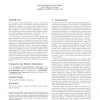Free Online Productivity Tools
i2Speak
i2Symbol
i2OCR
iTex2Img
iWeb2Print
iWeb2Shot
i2Type
iPdf2Split
iPdf2Merge
i2Bopomofo
i2Arabic
i2Style
i2Image
i2PDF
iLatex2Rtf
Sci2ools
IMC
2006
ACM
2006
ACM
Understanding churn in peer-to-peer networks
The dynamics of peer participation, or churn, are an inherent property of Peer-to-Peer (P2P) systems and critical for design and evaluation. Accurately characterizing churn requires precise and unbiased information about the arrival and departure of peers, which is challenging to acquire. Prior studies show that peer participation is highly dynamic but with conflicting characteristics. Therefore, churn remains poorly understood, despite its significance. In this paper, we identify several common pitfalls that lead to measurement error. We carefully address these difficulties and present a detailed study using three widelydeployed P2P systems: an unstructured file-sharing system (Gnutella), a content-distribution system (BitTorrent), and a Distributed Hash Table (Kad). Our analysis reveals several properties of churn: (i) overall dynamics are surprisingly similar across different systems, (ii) session lengths are not exponential, (iii) a large portion of active peers are highly st...
| Added | 13 Jun 2010 |
| Updated | 13 Jun 2010 |
| Type | Conference |
| Year | 2006 |
| Where | IMC |
| Authors | Daniel Stutzbach, Reza Rejaie |
Comments (0)

